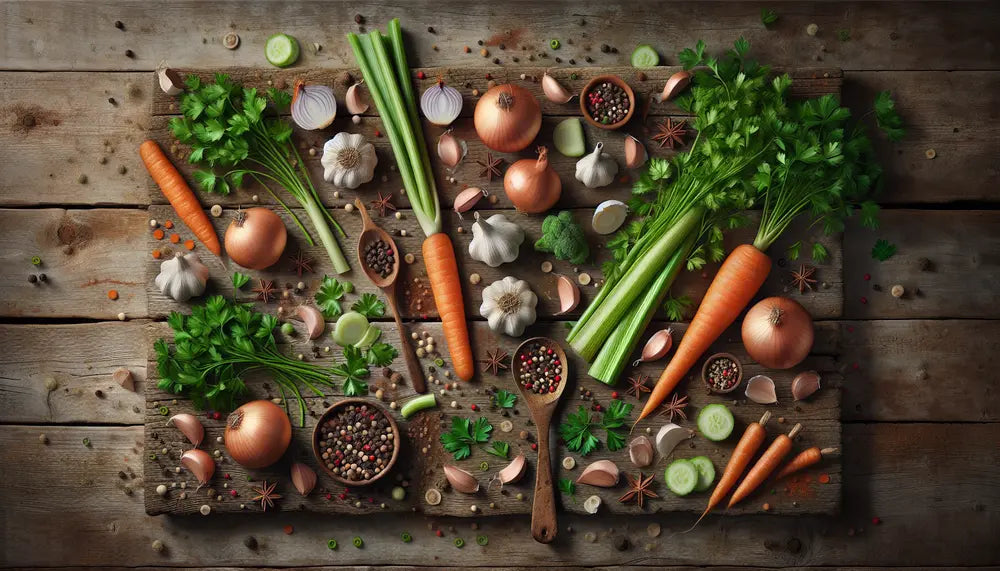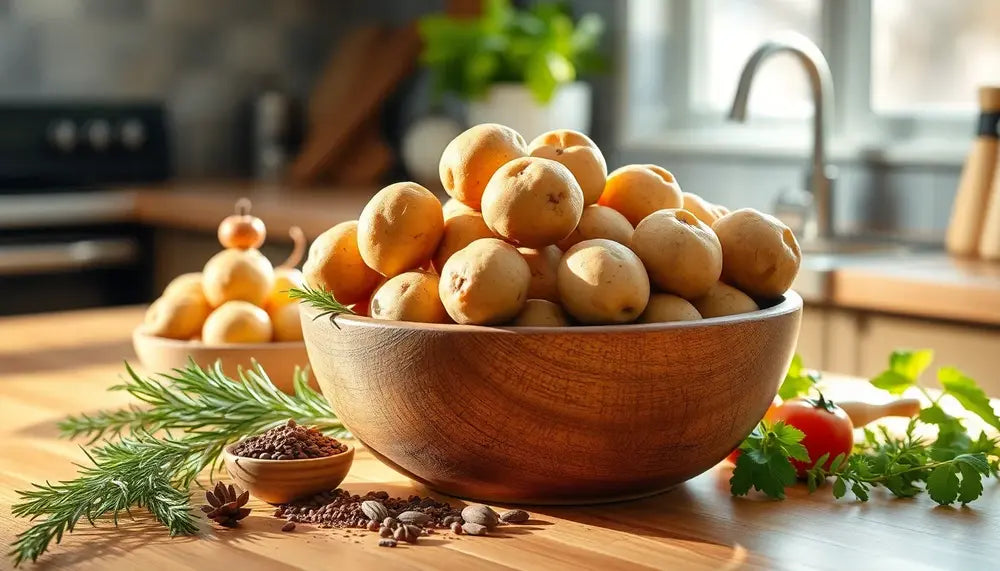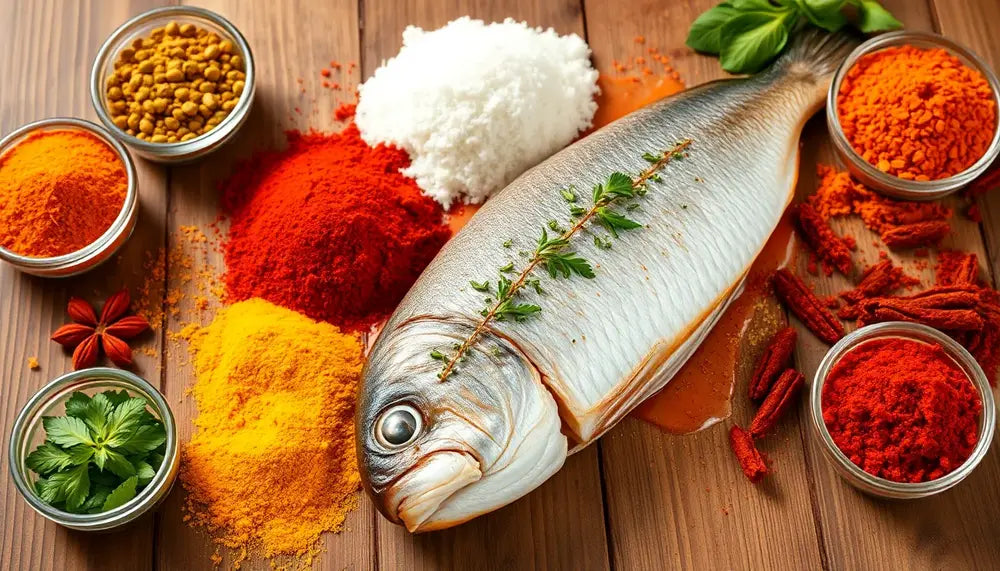The basics: Which spices are essential for chicken soup
To create a flavorful chicken soup, choosing the right seasonings is crucial. Certain spices are particularly popular for classic chicken soup and bring the desired aroma and spice to the soup. Here are the essential spices that should not be missing from any chicken soup:
- Bay leaves: They give the soup a tart note and promote digestion.
- cloves: With their strong, slightly sweet taste, they ideally complement the flavors of the chicken.
- Ginger: Fresh ginger gives the soup a pleasantly spicy and refreshing note.
- Star anise and Cinnamon: These spices bring an exotic warmth and are particularly popular in Asian versions of chicken soup.
- Rosemary and Thyme: These herbs give the soup a Mediterranean touch.
- Parsley: Often used as a garnish, it enhances the flavor profile of the soup with its freshness.
The combination of these spices not only adds flavor, but can also provide health benefits such as supporting the immune system and aiding digestion.
The right selection and combination of spices
The art of the perfect chicken soup lies not only in the choice of spices, but also in their correct combination. The secret of a harmonious soup is the balanced interaction between the different flavors.
It is important to remember that not all spices should be added at the same time. Some spices develop their flavor best when they are added early in the cooking process, others only develop their full effect when they are added towards the end of the cooking time.
- Laurel and cloves are added at the beginning of the cooking time to allow their tart and sweet notes to be incorporated deeply into the broth.
- Ginger, which is known for its spicy notes, can be added both at the beginning and near the end of the cooking time, depending on how intense you want the ginger flavor to be.
- Star anise and cinnamon However, they should not be cooked for too long, otherwise they could dominate. A short use towards the end of the cooking time is often sufficient.
- Rosemary and thyme They release their flavor best in the middle of the cooking process and should therefore be added around the middle of the cooking time.
- Parsley, often used as a fresh accent, is usually added just before serving to preserve its fresh, green flavor.
The dosage of the spices is also important. A rule of thumb is to start with a small amount and add seasoning if necessary. This avoids overpowering the chicken flavor with overly intense spice flavors.
A well-thought-out use of spices not only supports the taste and health benefits of chicken soup, but also makes it a real culinary delight.
Pros and cons of different spices in chicken soup
| Spice | Advantages | Disadvantages |
|---|---|---|
| Celery | Gives a fresh and spicy note | May cause allergic reactions in some people |
| Bay leaves | Goes well with meat; promotes digestion | Should be removed before serving |
| Nutmeg | Gives a slightly sweet spice | In large quantities it can be harmful to health |
| Carrots | Add sweetness and color | Need to be washed well to remove residue |
| Onions | Basis for a deep, rich taste | May irritate eyes when cutting |
| Parsley | Adds a fresh and slightly peppery note | Loses flavor if cooked for a long time |
| pepper | Enhances the overall flavor of the soup | Must be dosed carefully so as not to dominate |
| Salt | Necessary for flavor development | Too much can make the soup inedible |
Step-by-step instructions: Prepare chicken soup with spices
Making tasty chicken soup with the right seasonings can be easy if you follow a few basic steps. Here are instructions to cook this traditional soup.
- Preparation: Start by cleaning the chicken thoroughly. Then place it in a large pot and fill it with water until the chicken is completely covered.
- Add spices: Add the bay leaves and cloves once the water boils. These spices can remain in the soup throughout the cooking time to add depth and complexity.
- Cooking: Let the chicken cook over medium heat. Periodically remove the foam that appears on the surface to obtain a clear broth.
- More spices: About halfway through cooking, add rosemary and thyme. This gives the broth a flavorful depth without overpowering it.
- Final seasonings: Near the end of cooking time, about 10 to 15 minutes before removing the chicken from the pot, add ginger and optional star anise and cinnamon. These spices should not be cooked for too long to avoid an overdominance of flavor.
- Remove and cut up chicken: Remove the chicken from the soup, let it cool slightly and then break it into smaller pieces. Return the meat to the broth.
- Fine touches: Just before serving, add fresh parsley to give the soup a fresh touch.
These step-by-step instructions will help you create chicken soup that is rich in flavor and aroma. Carefully adding the spices at different stages of cooking ensures that every nuance comes through.
Tips on dosage and when to add spices
The correct dosage and timing of adding spices are crucial for the taste of your chicken soup. Here are some tips to help you get the most out of the flavors in your spices.
- Proportionality: Start with a small amount of seasoning and adjust if necessary. The rule of thumb is: approx. 1/2 teaspoon of solid spices (e.g. bay leaves) and 1/4 teaspoon of ground spices (e.g. ginger) per liter of soup.
- Flavor intensity: Keep in mind that the aroma of some spices such as cloves is very intense. Here you should use the dosage particularly sparingly; around 1 to 2 cloves per pot are enough.
- Add in phases: The order and timing of adding spices will affect the final result. Solid spices that require longer cooking should be added at the beginning, while delicate herbs like parsley should be added at the end to preserve their fresh notes.
- Make adjustments: Taste is key. After about two thirds of the cooking time, you should taste your soup and add more seasoning if necessary. This allows you to harmonize the flavors and ensure that no seasoning is too dominant.
The use of spices in chicken soup should be based on your personal taste. Experiment with quantities and adding times to find your own perfect soup variation.
Avoid common mistakes: What you should keep in mind when adding spices
When preparing a tasty chicken soup with spices, it is easy to make mistakes that affect the result. Here I'll give you some tips on how to avoid the most common mistakes when adding spices.
- Avoid over-seasoning: Too much of a good thing can easily ruin your soup. Be sure to start with a small amount and taste and adjust seasoning if necessary.
- Uneven seasoning: Make sure the spices are evenly distributed throughout the soup. Large clumps of spices can cause severe flavor changes. Stir the soup well when adding seasonings.
- Neglecting the brewing time: Some spices, especially whole herbs such as bay leaf or rosemary, need time to develop their full aroma. Give these spices enough time to steep in the soup before adding other ingredients.
- Unbalanced heat treatment: Different spices react differently to heat. While some, like cloves, require heat to develop their flavor, others like parsley can lose flavor from too much heat. Pay attention to the right time for the addition.
By following these tips, you can avoid many of the common mistakes that can occur when adding seasoning. A well-seasoned chicken soup can be a real treat when prepared correctly.
Variants of chicken soup: creative ideas with different spices
Chicken soup can be prepared in a variety of ways using different combinations of spices. Here are some creative ideas on how you can create exciting variations of your chicken soup using various spices.
- Asian variant: Give your soup an Asian touch by adding ginger, star anise, soy sauce, and a little sesame oil. A few slices of fresh chili can also be added for additional spiciness.
- Mediterranean variant: Herbs like oregano, basil and dill give your chicken soup a Mediterranean flavor. A squeeze of lemon juice before serving brings out the fresh herbal flavors.
- Mexican variant: Try a Mexican version with cumin, coriander, and a pinch of chili powder. Avocado cubes and a few drops of lime juice give this version a special touch.
- Indian variant: Curry powder, cumin, and coriander combine to create a warm, deep flavor that is typical of Indian cuisine. A spoonful of yogurt and fresh coriander give the soup a pleasant coolness.
These variations not only add variety to your cooking, but also provide the opportunity to experiment with flavors from different cuisines around the world. No matter which spices you choose, they can always give your chicken soup a personality of its own.
Conclusion: How spices make your chicken soup unforgettable
Proper use of spices in chicken soup can completely transform the dining experience. Carefully selected and measured spices turn a simple soup into an unforgettable dish that both delights the palate and ensures well-being.
Spices don't just contribute to... taste at, but also to Health, by promoting digestion and strengthening the immune system. Each spice brings its own Complexity and nuance of taste into the soup, making every meal a unique experience.
Whether you prefer traditional seasonings or creative combinations, chicken soup's flexibility gives you plenty of room for customization. Experiment with different seasonings and discover how they can change the flavors in your soup in ways that appeal to both your taste buds and your health.
In summary, the key to a memorable chicken soup is the clever use of spices. With the right spices, you can create not only a tasty but also healing meal that you and your loved ones will want to enjoy again and again.
FAQ about The artful seasoning of chicken soup
Which spices are essential for a classic chicken soup?
Essential spices for a classic chicken soup include bay leaves, cloves, rosemary, thyme and parsley. These spices provide a rich and deep flavor base.
How can you create an Asian version of chicken soup using spices?
For an Asian version of chicken soup, spices such as ginger, star anise and cinnamon as well as soy sauce and sesame oil can be used. These ingredients give the soup a distinctive, oriental-inspired taste.
When should delicate spices like parsley be added to soup?
Delicate spices such as parsley should only be added towards the end of the preparation to ensure their fresh and full aroma development, as they can lose their flavor intensity if cooked for a long time.
Can spices provide health benefits in chicken soup?
Yes, spices like bay leaves, cloves, and ginger offer health benefits such as aiding digestion and boosting the immune system. They also promote the absorption of nutrients from the chicken and vegetables.
How does cooking time affect the intensity of spices in chicken soup?
The cooking time can significantly affect the intensity of the spices. Hard spices like bay leaf or cloves should be added early to fully develop their flavor, while more delicate spices like parsley are best added just before serving to preserve their freshness.





Share:
Storing spices correctly: Tips for optimal storage
The taste of Italy in your kitchen: Spices for Italian cuisine